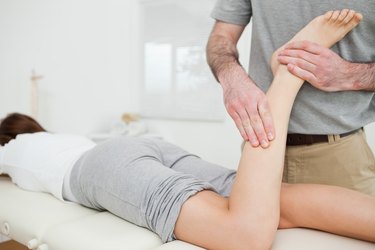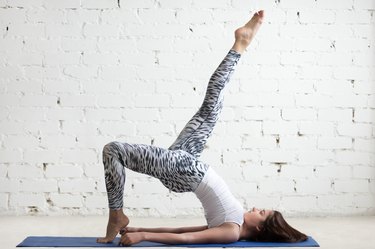
Muscles don't develop in a neat and orderly fashion. Some grow stronger at a faster rate than others. Sometimes a muscle on the left side will be stronger than its twin on the right side or vice versa. When one muscle is weaker than others it's more at risk for injury.
Hamstrings tend to be weaker then their counterparts, the quadriceps. Because of this muscle imbalance they're one of the most commonly injured muscles, so it's important to know if yours are particularly weak.
Video of the Day
Video of the Day
Hamstring Anatomy
Your hamstrings are actually four different muscles that start up in your hip and go down the back of your leg, past your knee, and attach to the top of your shin bone. There are two muscles on the inside, called medial hamstrings and two on the outside, called lateral hamstrings.
Since your hamstrings pass through your hips and knees, they're considered a two-joint muscle. That means they assist in movement of your knee and hip joints. They help your glutes extend your hip and also make your knee bend.
Read More: The Ratio of Hamstring Strength
You use your hamstrings when you run and do other lower body exercises like squats, lunges and deadlifts. They're an incredibly important muscle because you use them in so many movements. It's important to make sure that they're strong enough to handle whatever you throw at them.
Testing Hamstring Strength
Strengthening your hamstrings is generally a good idea to prevent any injuries to the muscle. However, you can test these muscles to see if they're truly weak.
Manual Muscle Testing
The most accurate way to test them is by using a manual muscle test. You need a partner -- preferably a physical therapist -- to properly perform this test.
To do the test: Lie down on your stomach with your legs out straight. Bend one knee so that it's at a 90-degree angle. Then, hold your leg in place while your partner tries to push the leg down to the ground. The purpose of this test is to isolate your hamstring and test its strength against your partners.
Read More: Anterior Pelvic Tilts & Hamstring Stretch
Your partner will grade the amount of strength that you have from zero to five. A score of zero means that there's no activity in the muscle at all, it's just limp. A three means that you can hold your foot in place without any resistance. A four means that you can resist your partner, but not for long. A five means that you can hold your leg in place against your partner.

You can get even more specific in manual muscle tests by testing each side of your hamstrings. Test the lateral hamstrings in the same position on your stomach with your leg bent. This time, point your toes to the outside and twist your leg out slightly.
To test the medial two hamstring muscles, turn your toes in slightly and rotate your leg towards the middle of your body.
Single Leg Bridge Test
You can test your hamstrings without the help of a partner with a single leg bridge test. Lie on the ground on your back. Bend your knees and bring both feet close to your heels. Bridge your hips up as high as you can. Then, kick one leg out straight and hold your hips up in the air as long as you can. Then, do the same thing with the other leg.
This is a great way to test each of your hamstrings individually. Whichever leg can't hold the pose as long needs a little extra strengthening in the gym. If neither leg can hold you up then you need to work on both hamstrings.

- Karen Kotila: Evidence-based testing of the hamstring muscles using EMG considering the kinematics and injury mechanisms of the hamstring muscle group
- Journal of Sports Science and Medicine: Functional and Neuromuscular Changes in the Hamstrings after Drop Jumps and Leg Curls
- British Journal of Sports Medicine: The predictive validity of a single leg bridge test for hamstring injuries in Australian Rules Football Players
- Minnesota State University, Mankato: Manual Muscle Testing
- National Institute of Health: Manual Muscle Testing Procedures
- Training & Conditioning: Handling Hamstring Injuries